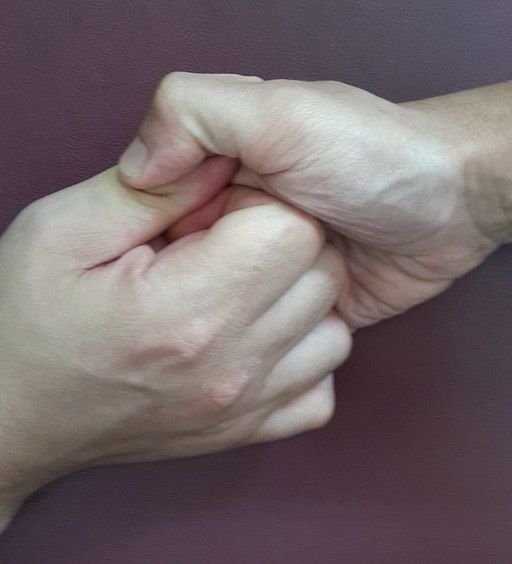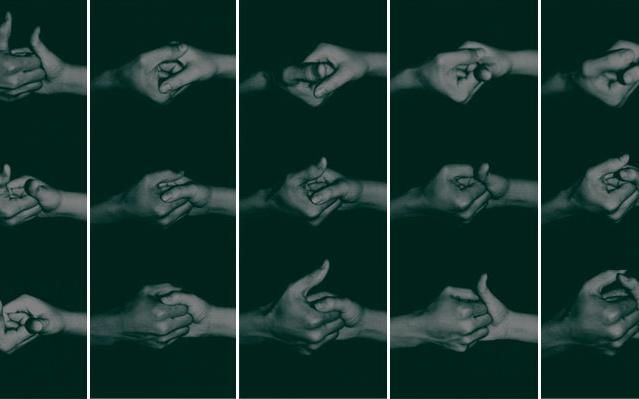Health
What are the Best Strategies for Good Health?
Simple things like "don't thumb-wrestle!"
Posted December 3, 2019

I tell my sister, "I'm having trouble with my hand." I've had diabetes for 46 years, and we both know that this is not good. I've already had carpal tunnel surgery on one hand and trigger finger surgery on the other. Now my dominant hand has changed again, leaving me with difficulty writing, cooking, and carrying heavy things. It isn't quite like trigger finger, though the pain and weakness are definitely in the joints and the palm. It's all in my fourth and fifth fingers.
"What happened?" Carolyn asks, immediately focused.
"It's embarrassing," I start, suddenly aware that in addition to embarrassment, there's fear. I need my hands.
Among other things, Carolyn is a psychiatrist, and so when she says, almost automatically, "That's okay," I realize that it is okay—not only is my sister very loving to me, she's also heard all sorts of really embarrassing things in her work. This isn't that embarrassing.
"On the way to poker a few weeks ago, Michael and I were thumb-wrestling in the back seat." She looks at me quizzically, so I explain: "It's a long way to Dave's house, and we were bored."
She shrugs. She and I spent many hours together in the back seat as children, and we never thumb-wrestled. But whatever!
"All of a sudden I felt my last two fingers tighten. And now I can't really use them, and they hurt, and they don't bend right." I show her, and she nods.
Carolyn looks at me with gentleness. "Well, my advice?" Her tone makes me smile. Her humor always smooths the way.
I nod, ready.
"Don't thumb-wrestle."
I laugh out loud.
And then she turns away a little, and I realize that the joke was not only protective of me, but also of her own reaction to my hands. She doesn't want me to see her own deep and enduring feelings of grief for her little sister, who copes with diabetes. She and I have been here many times before: through scary episodes of hypoglycemia and other stressors associated with my chronic illness. Carolyn says: "It's another way that diabetes can tighten the fingers."
I google it later, and learn that Dupuytren's Contracture occurs in the fourth and fifth fingers, is common in people with diabetes, and is treatable. I also learn that Dupuytren's is not caused by injury, so Michael gets no blame!
Carolyn's "Don't thumb-wrestle" humor was a strategy to cope with loss: if you can't prevent something, try to laugh at some aspect of it. Her expression makes me laugh now whenever I think of my "cheiroarthropathy," or hand problems associated with diabetes. And I'll do whatever I need to do to manage the Dupuytren's: exercises may help, a cortisone shot, and if necessary, more hand surgery. I need to stay in the moment; be mindful; not worry. I'll manage. I'm not going to lose my hands.
The phrase "Don't thumb-wrestle" is more than a joke, however. Carolyn captured a simplicity that I find useful. There are a lot of really simple things I can do to improve my health. I already use Nike's slogan, "Just do it," to motivate myself to get to the gym in the mornings when I really want to stay in bed where it's warm.
A bit of simple advice about diabetes management is pretty easy to follow if I focus on it: "Cut the carbs." I feel it work in my body and reinforce the benefit in my daily glucose numbers whenever I focus on that fundamental practice.
And then there are times when I just forget—or ignore—my daily medications (other than insulin) because I'm preoccupied or fatigued or simply resistant. How hard is it to follow my trusted doctor's orders, filled by my reliable pharmacist, for my own well-being and long-term health? Ten-second self-care just isn't that hard. "Don't be dumb," I tell myself, and open the pillbox.
"Don't thumb-wrestle. Just do it. Cut the carbs. Don't be dumb." Not very poetic. But effective ways to be happy, healthy—and maybe even, in their simplicity, wise.



